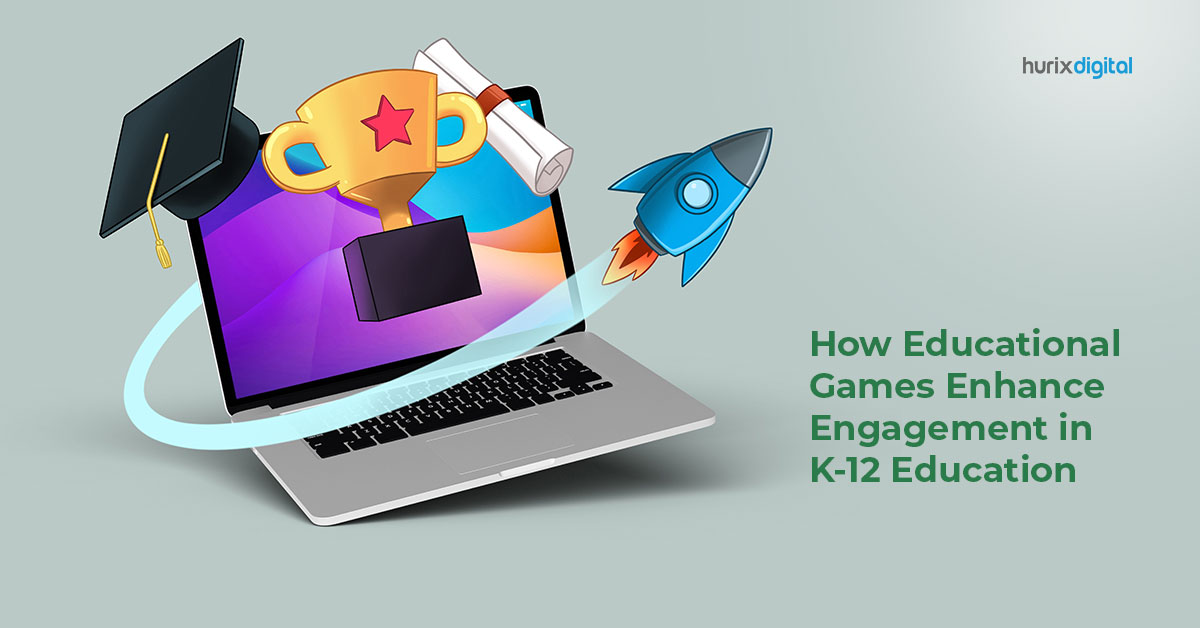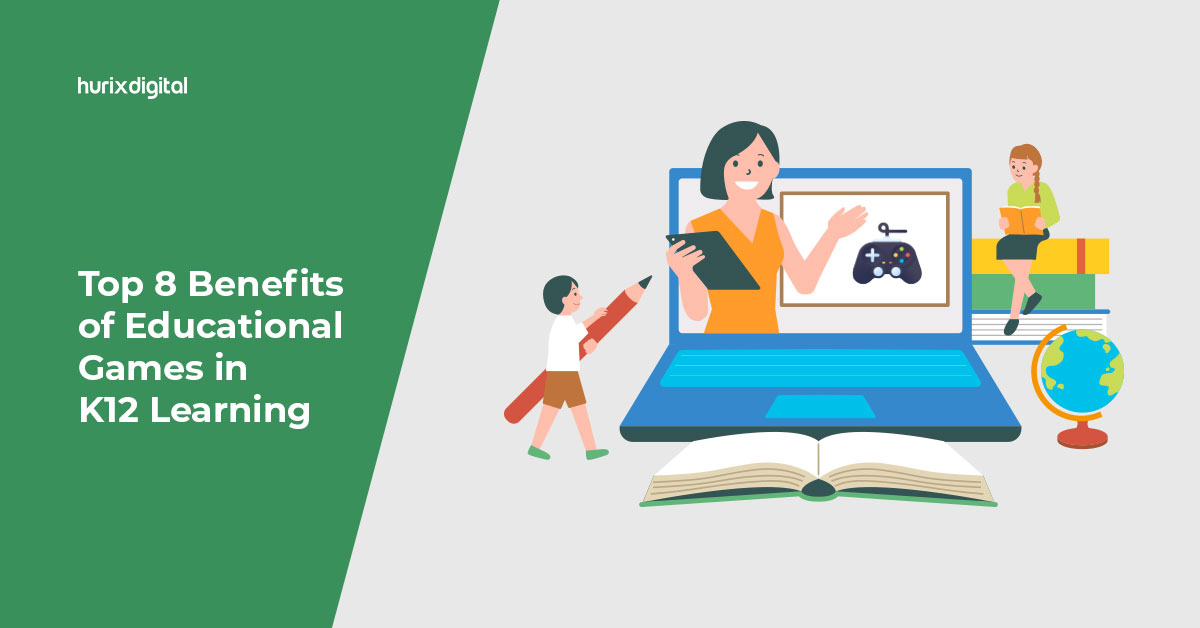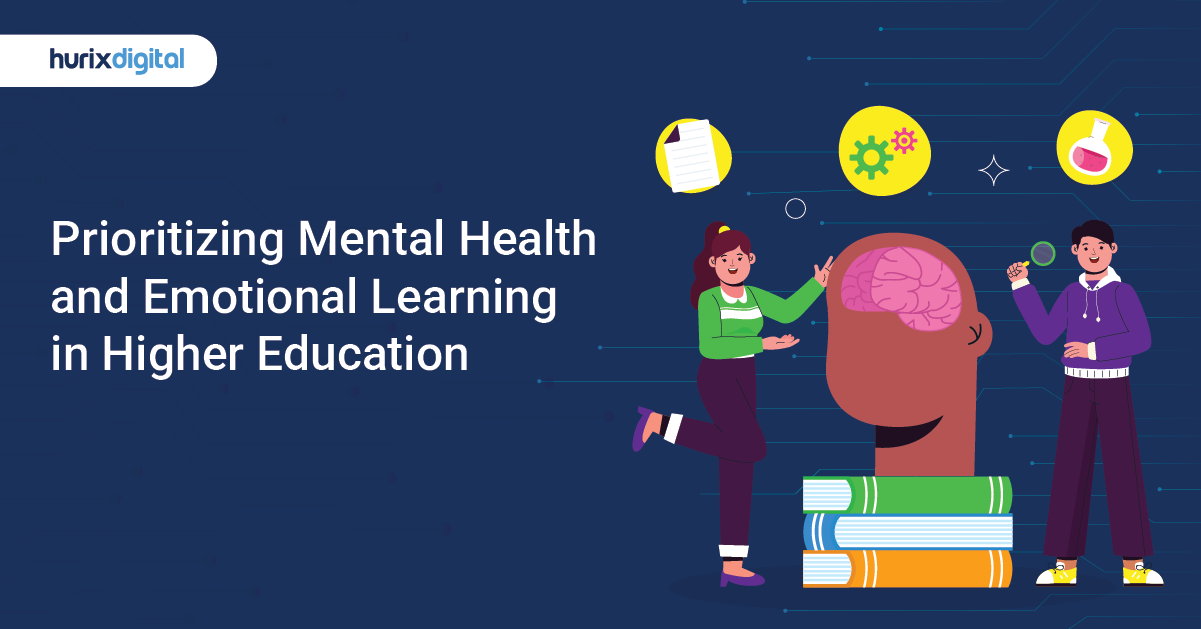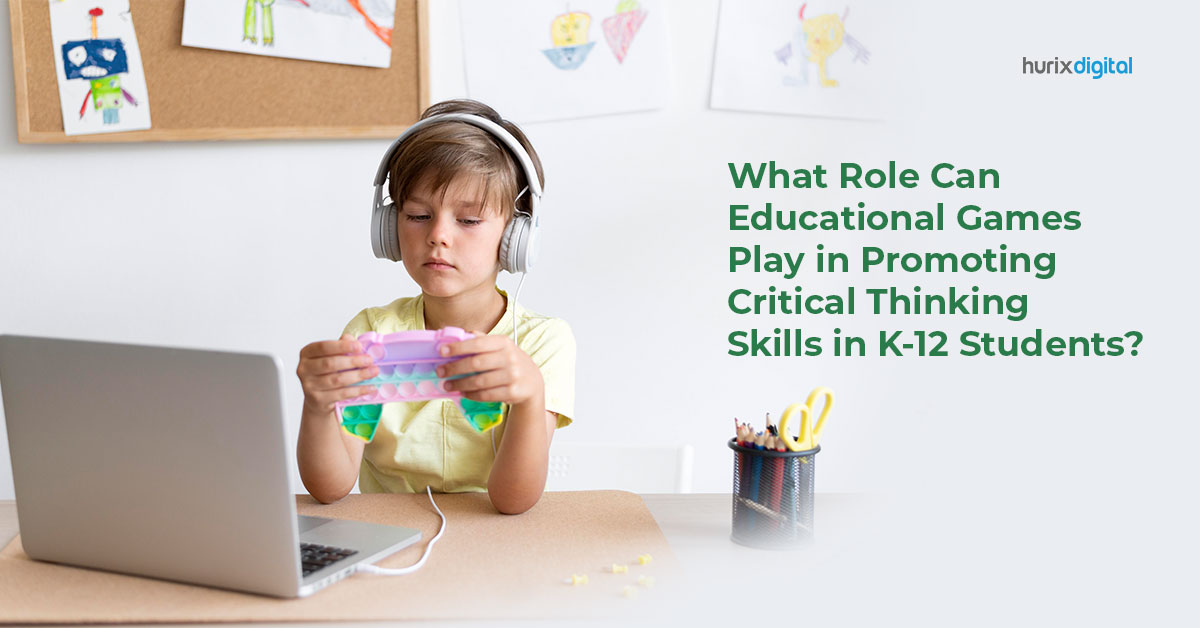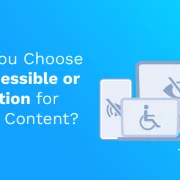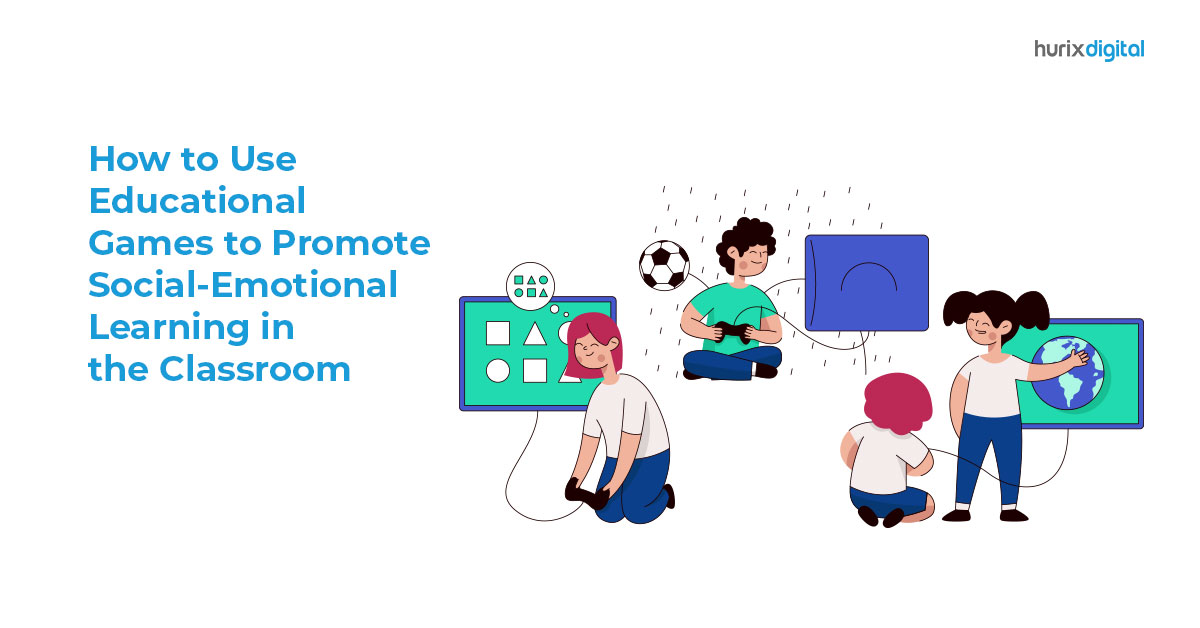
How to Use Educational Games to Promote Social-Emotional Learning in the Classroom
Summary
This article provides guidance on using educational games to promote social-emotional learning in the classroom, focusing on emotional intelligence, empathy, and collaboration.
Educational games can play a valuable role in supporting social-emotional learning (SEL) by providing interactive and engaging experiences that foster the development of key skills and competencies. SEL in the classroom refers to a process by which individual students apply knowledge, skills, and attitudes necessary to understand and manage their emotions, develop positive relationships, make responsible decisions, and demonstrate empathy and social awareness. Read on for ways educators can integrate educational games into social-emotional learning curriculum, and reasons that social-emotional learning games benefit students.
Table of Contents:
- Social-Emotional Learning Core Competencies
- Gamifying Social-Emotional Learning
- How to Support Social-Emotional Learning in the Classroom With Educational Games
- SEL in Education: Traditional Teaching Strategies Supported By Educational Games
- Social-Emotional Learning Games from Hurix & Game Learning
Social-Emotional Learning Core Competencies
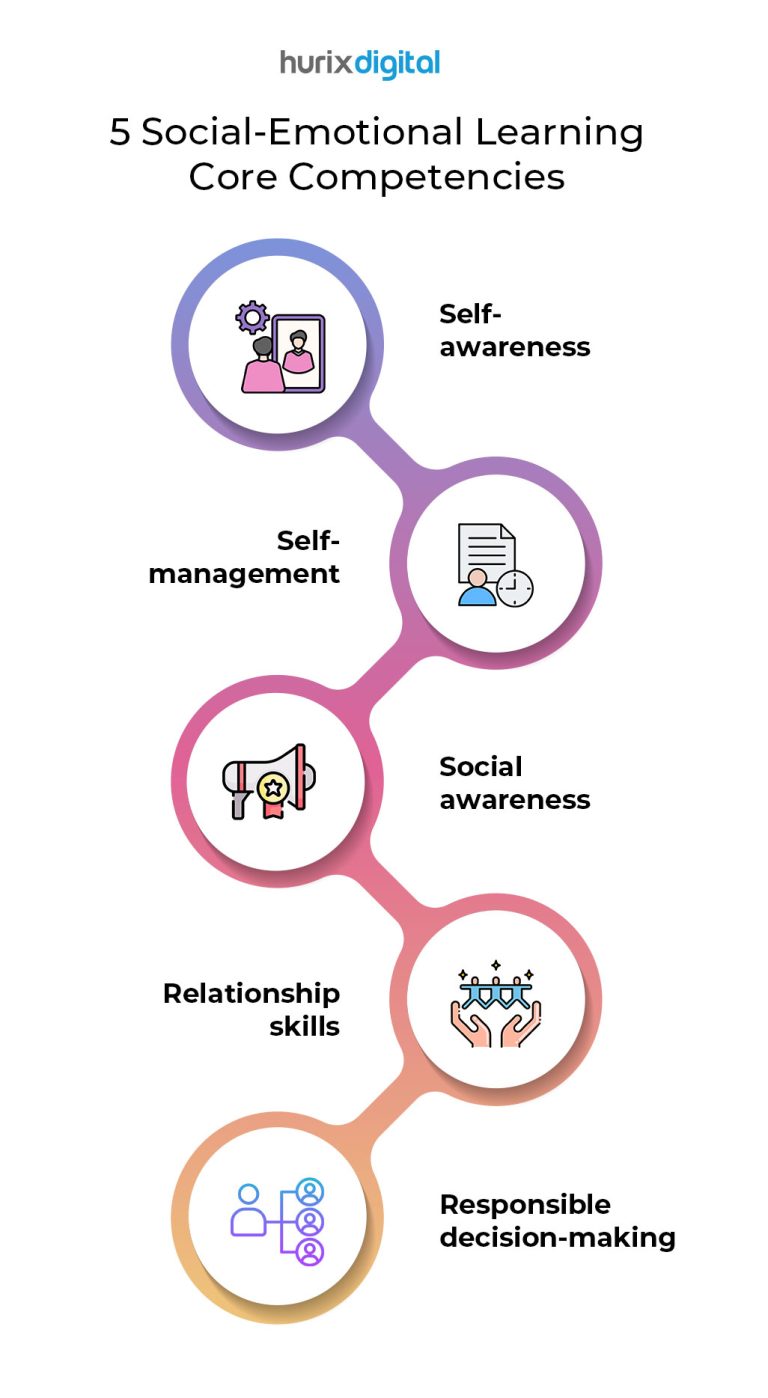
Social-emotional learning is built around five core competencies.
Self-awareness
Recognizing and understanding one’s own emotions, strengths, and limitations. Self-awareness requires the development of a sense of identity and a positive self-image.
Self-management
Social and emotional learning activities that are core competencies of SEL in the classroom prioritize skills to regulate and control emotions, thoughts, and behaviors. Self-management includes stress management, impulse control, problem-solving skills, and goal-setting.
Social awareness
SEL in education counts cultivating empathy and understanding of others’ perspectives, experiences, and emotions as a core competency. Social awareness includes recognition and respect for diversity, appreciation for the importance of social norms and values, and an effort to practice empathy.
Relationship skills
Social-emotional learning emphasizes the development and maintenance of healthy and positive relationships. Skills acquired through social and emotional learning activities include active listening, cooperation, teamwork, effective communication, negotiation, and conflict resolution.
Responsible decision-making
SEL in education also aims to teach students to learn to make ethical and constructive choices considering the well-being of themselves and others. This core competency includes identifying and analyzing problems, evaluating consequences, and taking responsible actions.
Gamifying Social-Emotional Learning
SEL in the classroom is integrated into the K12 curriculum via both new teaching strategies and traditional teaching strategies. One of the primary ways educators introduce SEL in education is through gamifying social-emotional learning.
Gamifying social-emotional learning may be as simple as having young students learn all of their classmates’ names, and one interesting fact about each of them, and then recite what they’ve learned. However, in recent decades, tremendous innovation has gone into gamifying SEL in the classroom, via educational video games.
For example, social-emotional learning activities in video games may be seen through History games, which require students to view historical events from various perspectives. In other cases, SEL is developed by assigning students to work collaboratively in teams to achieve the objectives and goals of various educational games. SEL in language arts can help foster a greater vocabulary that is also inclusive.
Also Read: 5 Strategies for Leveraging K12 Content Solutions to Increase Student Engagement
How to Support Social-Emotional Learning in the Classroom With Educational Games
A majority of educators have recognized the potential of educational video games to deepen social-emotional learning among students. Thanks to the interactive and engaging nature of social-emotional learning games, they provide a unique platform for K12 students to nurture essential social and emotional skills. However, for SEL in the classroom to be a success, educators should consider these best practices.
Choose Purposeful Games for SEL in the Classroom:
Educators must be mindful to select educational games that align with SEL goals and competencies. To that end, games should align with the social-emotional learning curriculum, and provide in-game social-emotional learning activities.
Games that focus on empathy, collaboration, emotional recognition, and problem-solving are mostly likely to align with the social-emotional curriculum. Before integrating a specific game, be sure to confirm suitability for the age group, and accessibility/availability to all students.
Begin and End GamePlay with Discussions
Before students begin playing social and emotional learning games, educators should discuss SEL themes presented in the game. After students have finished playing the game, a second discussion should be opened wherein students share emotions, experiences, or thoughts they had while playing the game.
Because many games used to enrich SEL in the classroom pose moral dilemmas to students, a robust discussion often emerges. Likewise, issues of consequences of actions for themselves and others are a frequent theme in social-emotional learning games, which can help bolster emotional control. Discussing the choices made, the options available, and the consequences of various choices offer an incredible opportunity for students to benefit from taking ownership of decisions, and recognizing their strengths and weaknesses in the application of various skills.
Include Games that Require Teamwork In Social-Emotional Learning Curriculum
SEL in education requires cooperation. Therefore, educators should introduce games that require collaboration and teamwork. These types of social-emotional learning activities encourage students to work as a team to achieve their common goal.
Research has shown that cooperative gameplay cultivates communication skills. This is likely to translate to greater conflict resolution and nurture empathy. To that end, gamifying social-emotional learning with multi-player or team games encourages students to share responsibilities, listen to each other, respect the ideas of others, and work cooperatively.
Incorporate Games that Promote Self-Awareness to Bolster SEL Education
Since self-awareness is a core competency of social-emotional learning, SEL in education should support students with games that facilitate self-awareness. Educational games that present students with scenarios that require them to make decisions, and then explore outcomes from those decisions or alternative decisions are a great tool that can be aligned with the social-emotional learning curriculum.
SEL in Education: Traditional Teaching Strategies Supported By Educational Games
Educational games that align with the social-emotional learning curriculum can be powerful tools for promoting social-emotional learning in the classroom. Through the careful selection of purposeful games, educator-led post-gameplay discussions, and integration of reflective activities, educators can create an environment that cultivates empathy, collaboration, and emotional intelligence.
Integrating educational games for SEL must be thoughtful, and intentional. Games must provide age-appropriate content, offer diverse perspectives, promote inclusivity, and support ethical considerations. Integrating games with thoughtful discussions, reflection activities, and in-person guidance from educators is sure to enhance the social-emotional learning experience.
It bears repeating that implementing educational games in the classroom should support the social-emotional learning curriculum. Even the best-designed social-emotional learning games can’t replace traditional SEL in the classroom. Instead, gamifying social-emotional learning via online games should enhance traditional teaching methods.
Social-Emotional Learning Games from Hurix & Game Learning
Social-Economic Learning has always been a key component of education for children, and its relevance will keep on growing, especially with the advent of technology. It is important to take care of this aspect of children to promote all-around development.
Game Learning, a leading EdTech company, has partnered with Hurix, one of the world’s leading digital curriculum providers to offer social-emotional learning games for the K12 curriculum. To learn more, or to request a free demo, contact Hurix Digital today.
Frequently Asked Questions (FAQs)
1. Can educational games improve students’ social awareness and empathy?
A. Yes, games can simulate social situations, diverse perspectives, and characters, allowing students to experience and develop empathy, cultural understanding, and awareness of others’ emotions.
2. What are the benefits of incorporating educational games for social-emotional learning in the classroom?
A. Benefits include increased student engagement, improved social skills and empathy, enhanced problem-solving and decision-making abilities, and the opportunity for students to learn and practice social-emotional skills in a safe and interactive environment.
3. Can educational games improve students’ social awareness and relationship skills?
A. Yes, educational games can improve students’ social awareness and relationship skills by simulating social interactions, fostering cooperation and teamwork, and providing opportunities for students to practice effective communication, problem-solving, and conflict resolution.
4. Can educational games be used for individual and group social-emotional learning activities?
A. Yes, educational games can be used for both individual and group social-emotional learning activities. Some games offer opportunities for individual reflection and learning, while others encourage collaboration and teamwork.
5. Are there resources available to help teachers find educational games for social-emotional learning?
A. Yes, there are resources available to help teachers find educational games for social-emotional learning. Educational technology websites, curated collections by educational experts, and online platforms dedicated to SEL provide recommendations and resources for integrating games into the classroom.

Matt Massman is the Founder and CEO of Game Learning, a leading EdTech company based in Los Angeles. Massman has spent his career developing educational tools to improve the way students learn. Previously, he launched Vinci Academy with Dr. Dan Yang. As Founder and CEO of Mass Equity, a privately held real estate development company, he has facilitated more than $1 Billion in developing preK-12 educational facilities.
